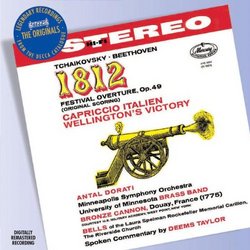Best version of 1812 I've heard
Lisa Stubblefield | IL | 04/13/2008
(5 out of 5 stars)
"The 1812 Overture is one of my favorite pieces of classical music. Having said that, most versions of it I hear are poor. They overuse chimes at the end. Or they substitute drums for gunshots. Or they contain a choral component that annoys (I don't really feel the song favors that).
The first time I listened to the last 3 minutes of this version, I almost cried. It is THAT amazing. The cannons and bells are fantastic. I've never heard a version that can compare to this. I've read that this recording is the way Tchaikovsky intended the piece to be heard, and it truly is brilliant.
Wellington's Victory is also exceptionally well done. I'd never heard the piece before and was pleasantly surprised. Again, the cannons and guns are incredible.
If you're a fan of either of these compositions and looking to fill out your collection, don't pass this one by. I'm extremely glad I discovered it."
An 1812 For the Ages, Plus Other Goodies!
James Yelvington | USA | 10/05/2009
(5 out of 5 stars)
"This review is based on the earlier 1995 release, not this remastered version; still, most all of my remarks should apply here.
So many others have reviewed this disk that I hesitate to add a word. Still, as I've been re-examining some Russian music of late, I'll put in my two cents.
First, this 1812 is still spectacular, even after almost 50 years! Antal Doráti, a specialist in the music of Tchaikovsky (and Haydn), brings out the best in the Minneapolis players and provides the surefooted leadership needed to make it all work out brilliantly. (He was a particularly inspirational conductor--as I recall from playing under his baton in Stuttgart just before this recording was made--and he led more than one struggling orchestra back from the graveyard.) His conducting of the London Symphony in Beethoven's Wellington's Victory is also well-conceived, resulting in a very satisfactory--as well as exciting--performance. The Capriccio Italien, while often lively and showy, is not the same sort of bombastic music, yet here too Doráti brings out all the brilliance and charm of this fine, colorful, and delightful piece.
I want to point out here one particular programmatic element in the obviously rather programmatic 1812. Just after the first 5 cannon shots are fired amid repetitions of the French Marseillaise motif--seemingly denoting Napoleon's domination of the battle--which occurs just before the climactic ending, there is quite a long passage of all the strings in unison starting at a relatively high pitch and then descending in tetrachords down to the lowest range. I believe that is Tchaikovsky's depiction of the fall of the French forces, for just afterwards we hear the return of the opening Russian Orthodox hymn "God Preserve Thy People" played in force with (Russian?) cannons firing and all the bells of Moscow ringing out: obvious victory music. And from there on it's all glorious celebration to the smashing close!
Inevitably the physical sound quality here does not rise to the purity and sumptuousness which digital recording can ideally produce, but, as experience has shown time and again, the overall effect of a recording depends more upon other factors, which in this case are overwhelmingly favorable. This recording holds its own--and then some--against the more modern takes on the music, so it merits five stars.
Recently I reviewed here the 1998-99 Telarc CD recording with Kunzel and the Cincinnati Pops. My conclusion on the 1812 is that both are fine recordings, and I delight in having both at hand. Sometimes I may prefer the great sound quality and fine choral singing of the Telarc; other times I may want the sheer sonic excitement and more satisfying interpretations of this Mercury disk. It's great to have both, but if you must choose one, I hope these few words will help.
"
A LEGENDARY PERFORMANCE & RECORDING but a choir?
G. Engler | The Frigid Northeast | 12/18/2008
(5 out of 5 stars)
"Dorati's performance is thrilling,and ties with my other favorite, the aforementioned Ormandy performance with the Mormon Tabernacle Choir (!), the Valley Forge Military Band and pre-recorded- all-too-perfect-to-be-really canons.
Tchaikovsky didn't write the opening with a chorus. Ormandy added the vocal introduction of the Russian hymn that Tchaikovsky uses for the opening theme. The choral introduction works well - and sets the stage for the fireworks that follow!
That said, Dorati's interpretation is a classic, and quite thrilling. The recording too is legendary, and very well balanced - a great example of Mercury's two microphone recording technique later employed so effectively by Telarc in the early years of digital recording.
Sample either and you can't go wrong."


 Track Listings (6) - Disc #1
Track Listings (6) - Disc #1